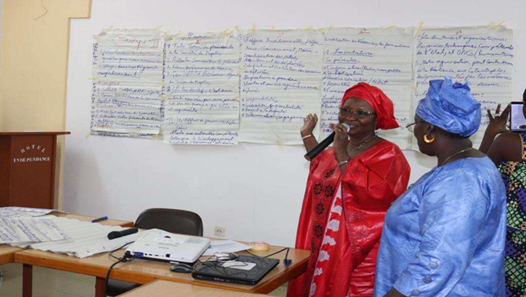Fatoumata Goundo Sissoko
Meet Goundo, who is dedicated to building women's capacity in disaster risk reduction and climate change adaptation, capitalising on existing skills and knowledge.
"Developing women’s capacity for a safe and secure environment"
This interview was conducted during the High-Level Forum on “Inclusion, leadership, and participation of women and girls in humanitarian action and risk-informed recovery and resilience”, organised by UN Women and the Lake Chad Basin Commission, in Yaoundé, Cameroon, between the 14th and 16th of September 2021.
Can you please introduce yourself as well as your organisation?
I am the president of the Women's Network for Environmental Rights (REFEDE- MALI). REFEDE-Mali is a non-profit, strictly apolitical Malian women's civil society organisation, created in October 2013. REFEDE-Mali is a network dedicated to knowledge exchange and action.
REFEDE’s goal is to ensure the environmental rights and protect nature-based livelihoods of marginalised groups, against the negative effects of climate change and environmental degradation in Africa and in particular in Mali.
To achieve this goal, REFEDE Mali firstly promotes the rights for women and the most marginalised groups to a clean environment, and safe and healthy lives and working conditions.
Secondly, we work to strengthen the capacity and knowledge of women on environmental rights, legislation, regional and international frameworks (such as the Sendai Framework for Disaster Risk Reduction), and risk-informed decision making and resilient livelihoods.
Finally, we raise awareness among decision-makers on laws, regulations, policies, and the institutional framework for better disaster, climate and environmental risk management in Mali and in Africa.
What are the key disasters and threats that are experienced in the communities where you work?
Our country, Mali, faces multiple threats. Floods, high winds, and droughts are the main natural hazards we regularly have to deal with. We also face technical and chemical disasters such as fire in public market spaces. These are linked to the lack of health and safety, as well as contamination in traditional gold mining areas. The security issue in the Sahel is also a tremendous threat.
How are women and girls impacted differently by disaster and threats such as climate change, conflicts, pandemics, where you work?
Rural women are the most affected by these threats. They are the ones who live and work next to traditional gold mining areas and thus are exposed to chemicals, as well as their children. They have little financial resources, don’t have access to solid and efficient agricultural and farming tools and implements, and suffer from poor access to education and information. They really struggle to ensure decent and constant earnings and as a result, are not able to prevent crises or develop coping mechanisms. We also noticed that, in case of emergency, women and children are often left behind since they struggle to escape or find a safe shelter.
We need to develop mechanisms and design significant initiatives that can help women to enhance their capacity and give them the opportunity to empower and become more independent.
What do you think are the main barriers to gender-responsive and inclusive disaster and climate risk reduction/resilience building in conflict context?
Security is currently a priority issue for governments in the Sahel region. It is actually overshadowing the environmental problems somehow. Government’s attention, and especially budgets and funding, are focused on the security crisis. Governments react when disasters have already happened and concentrate their action on emergency response (with short-term food donations).
We really need to focus on women’s capacity building in disaster risk reduction (prevention, preparedness) and climate change adaptation, to train them in these areas of work to help women make informed and efficient decisions. We need to encourage them to build networks in order to influence disaster management related decisions."
What are the barriers that your organisation is facing?
Our organisation is based in the capital city Bamako, but we also work a lot in other regions of the country. It is really hard for us to travel to different parts of the country because of the security situation. The security context, as well as people’s daily economical struggle, restrain our actions.
It is hard sometimes to convince people that preparedness is important to prevent difficulties and avoid disasters. The mobilisation of financial resources and building partnerships are also important challenges for us.
How is your organisation helping women in Mali cope with these challenges?
Disaster risk reduction is an essential pillar of sustainable development and requires a society-wide approach. Indeed, it is essential to integrate the concerns, needs and skills of men and women equally into disaster risk reduction and develop risk-informed recovery policies and programmes.
In partnership with Malian institutional partners, international NGOs, UN Entities and other international organisations, we dedicate our time to women’s capacity building in disaster risk reduction and climate change adaptation. We trained a hundred Malian women leaders on key concepts such as prevention, disaster risk reduction, gender, and leadership.
The training was conducted within the framework of the CREWS project (enhancing hydro-meteorological observation, monitoring, and impact forecasting services), which was supported by the World Bank, and coordinated by the Directorate General of Civil Protection. An agreement for gender assistance to the project coordinator was signed between the President of REFEDE-MALI and the World Bank.

We were also part of a project which aimed to inform and raise awareness among women about the dangers of using chemicals (agriculture, gold mining, cosmetics, cooking, etc) in partnership with PAN AFRICA, financed by Global Green Fund. We identified women in need and offer them training on disaster preparedness, early warnings and resilient livelihoods. We organised, for instance, activities around vetiver resources (plant with water purification virtues) for women living in gold mining areas. We also encourage the development of businesses around local products transformation and small forestry. It allows women beneficiaries to realise that nature-based activities can be sustainable and generate incomes.

What more could your organisation do? What are the key opportunities?
We aim to have a significant pool of women leaders with knowledge and skills in disaster risk reduction and climate change adaptation who can be a relay and build other women’s capacity in their community. We are also considering doing a mapping of women traditional knowledge because we want to capitalise on the existing skills and share them with the community.
Are you aware of any good practices or innovative initiatives in this area?
During this High-Level Forum on “Inclusion, leadership, and participation of women and girls in humanitarian action and risk-informed recovery and resilience”, I had the opportunity to meet colleagues from other networks, in particular the Global Network of civil society organisation for disaster risk reduction (GNDR). GNDR is the largest international network of organisations committed to working together to improve the lives of people affected by disasters world-wide. They adopt a “from the frontline” strategy which consists of reaching out to the communities and encouraging them to self-identify the risks and threats they are dealing with or can potentially deal with, and how they can face them.
At REFEDE Mali, we are aware of the importance of belonging to a network. We are part of: RESO Climate Mali; the civil society national Platform for climate change, environment and sustainable development (PNASC-CED); the National Platform for Civil Protection and Disaster risk; the Coalition for the environment and chemical products; the International POPs Elimination Network (IPEN); and the Regional Network for Sustainable Development (RNS).
